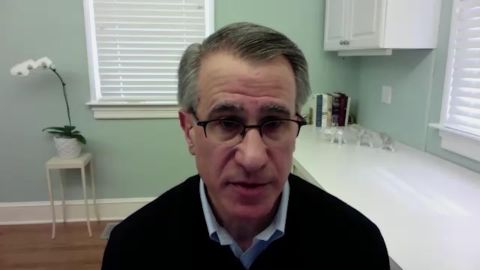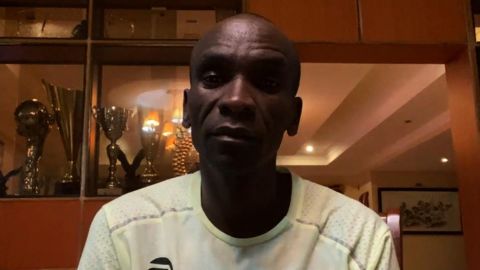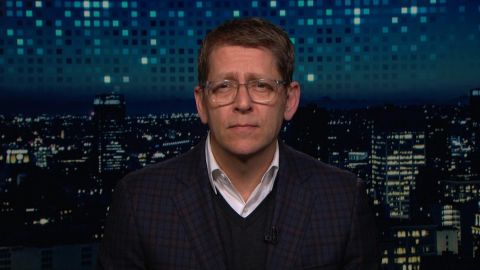Read Transcript EXPAND
CHRISTIANE AMANPOUR: Tufts University, just outside Boston, Massachusetts, has transformed parts of its campus into a military-style hospital. And students are also now using their skills to support the health care system. Anthony Monaco is president of Tufts. And he spoke to Walter Isaacson via Zoom.
(BEGIN VIDEOTAPE)
WALTER ISAACSON: President tony Monaco, thank you for joining us.
ANTHONY MONACO, PRESIDENT, TUFTS UNIVERSITY: Pleasure to be here, Walter.
ISAACSON: What are universities like yours doing in this crisis?
MONACO: Walter, we have been having conversations with our hospitals about their needs, which are in several different areas. We have been able to help them now with lab supplies, masks, helping to repair old masks, sending ventilators from our veterinary hospital. In addition, they are very concerned about the beds availability, especially if there’s a surge. And they have asked us to think about our campuses as alternative treatment centers, which could house emergency personnel, low- level patients that are in-patients currently that are having a bottleneck getting people out. We’re looking at all kinds of possibilities. We have isolation units on campus because we had an outbreak. So we are organized to be able to isolate any cases that occur.
ISAACSON: You have written an op-ed about additional steps that should be taken. Walk us through those, please.
MONACO: Oh, well, Walter, first, if you’re going to change your campus into a military-style hospital, you have to have military logistics and communications advice. We were very lucky to have that at our Fletcher School. And those military fellows and faculty there have stepped up in the most amazing way, can-do attitude, giving us advice, not making decisions, relying on our expertise, and they have been helping, as I said, our hospitals and cities. Secondly, you need to inventory all your rooms for single-use bathroom isolation units, which ones are on the periphery, which ones are near parking lots. Third, think about the future as a testing center, as well as overrun facilities for hospitals. Testing is very important. Think about ways you can help with medical supplies, contact your cities, make partnerships, give your capabilities to your local officials in some kind of incident command center.
ISAACSON: Would you be willing to allow patients to live in the dorms?
MONACO: Absolutely. One of the things that has been found in China is, 75 to 80 percent of transmission is through family units. If the case arises that a relatively mild case is in a family with an elderly, vulnerable person or immunosuppressed person, we could help isolate them if they have nowhere else to go. It’s an effective intervention strategy, and we’re willing to adopt it.
ISAACSON: What about helping to do things like make masks? Are your students trying to pitch in, those who are still there?
MONACO: Yes, Tufts Medical Center has given a donation of 6,000 N95 masks, but they’re very old. And every time they put them on, the elastic broke. So, we quickly organized some of our engineering students to work with MIT and Harvard students. They came up with a prototype. And they’re already starting today to repair these masks, which really significantly increases the capacity of the medical center.
ISAACSON: You’re a distinguished geneticist. You helped discover the gene that causes some forms of muscular dystrophy. To what extent do you think genetic tools someday will be able to be the way we fight off viruses?
MONACO: I don’t think genetics in this particular case has got that much to do with it. But this is about vaccination and prevention, and being ready the next time and being prepared. Right now, the only tools we have are testing and isolation. We need to focus on that, and we need to think about, what is going to happen in one month’s time, when the hospitals are overrun, the alternative treatment centers are full? We need a scalable way to monitor fevers at a distance and get mobile units to those that are most vulnerable, so we can help them, and they don’t require hospitalization.
ISAACSON: So, describe to me how you are setting up on the Tufts campus what is really a satellite medical center.
MONACO: We have looked at our complete building stock in our dining, halls and we have gotten military logistics and communications help from our Fletcher School of Law and Diplomacy. They have been advising us, Tufts Medical Center, and our cities of Medford and Somerville local to our campus. We have identified all units that have single-use bathrooms that can be used for isolation. We have identified units that could house nurses, health care workers, those that don’t want to go back to their families, if they’re at increased risk, and perhaps infect vulnerable members. We’re going to take low-level medical patients that need things like wound care, post-operative P.T., things that are not going to require a full hospital suite. That’s in conversations, but we are preparing for that.
ISAACSON: And are you working in collaboration with Harvard, MIT, and the hospital systems, which I think is probably the largest hospital systems per capita in the country in the Boston-Cambridge metro area?
MONACO: Yes, they’re all communicating at the hospital level. And we have been in communications at the university level. They’re all reaching out to particularly their teaching-affiliated hospitals, where they know each other well. And they’re listening, what are your needs, how can we help?
ISAACSON: You have had a student who tested positive. First of all, how is the student? How are the people there?
MONACO: The student is fully recovered. He did expose a large number of students. We traced them all. We isolated all of them in quarantine in whatever they were. And, right now, they all seem to be fine. I’m just getting reports. But we haven’t had a major outbreak within the student body, luckily.
ISAACSON: Your international students, are they frustrated by having been given very little notice and having trouble to manage this crisis?
MONACO: Of course they’re disappointed, Walter, but, then again, we have received multiple e-mails from their parents thanking us for allowing them to stay, so grateful that they were able to stay put, try to be safe and not take that dangerous trip back to a level three country. So, most of it has been about their needs currently on campus, but a lot of gratitude from parents that we were able to accommodate.
ISAACSON: What have you done about poorer students, for whom it’d be difficult to go home or maybe not even that safe to go home? Do you allow them to stay on campus?
MONACO: If they have circumstances which was very reviewed by the Student Affairs Office that didn’t have a home destination or those types of situations, yes, some of those were permitted to stay. And we do still have a lot of students living off-campus in houses that are not owned by the university. And so we have been communicating with them as well. We have offered on travel costs, anything we can do. There’s been a very good fund-raising effort through the students to help. And we have organized that through our Advancement Office. And there are funds available and assistance when students need it.
ISAACSON: Is there anything you did that you wish had been done slightly differently, and other universities might learn from your mistake?
MONACO: No. I’m sorry, not that I have made any mistakes, but when we found out that we had a covert positive student, I made two phone calls. One was to get the health authority aware, follow their protocols for tracing, et cetera. The second was to former allied commander of NATO Jim Stavridis, former dean of the Fletcher School, asking him for military logistics help, which he pointed me to. That was an important step so that, right from the beginning, we were not making missteps that we would regret when the number of patients that we’re trying to help increases exponentially.
ISAACSON: I’m teaching my class at Tulane through this method, through Zoom. It’s something that we in the education industry have talked about for a decade, which is online classes. But we never really did quite as much as we thought we would. Do you think that this situation is going to help increase the use and blending in of online classes and universities?
MONACO: Yes, out of the necessity of the situation, we are running all of our courses for the rest of the semester, many using Zoom and Canvas. It’s a wonderful technology. I certainly appreciate it how well it’s going to be suited to our needs. I do think you’re right that it’s going to change how colleges and universities think in the future. And the fall semester is at risk, given how long this might last. And we’re all planning that we have to consider at least continuing this type of distance learning. We hope not, but we are preparing.
ISAACSON: Do you think we have to balance the need to isolate to control this disease vs. the need of people who are students just to get on with their lives and get back to campus? Would you push back on a fall closure?
MONACO: I think there’s two needs here. Obviously, as an academic institution, our primary mission is to educate our students and to do so in this time of crisis. At the same time, this is a disaster of very large proportion. You have seen the scenes from Italy. It’s going to happen here unless we organize ourselves to help the hospitals. I have said it before. This is a Dunkirk moment for our country. And if we don’t get out the boats to get our hospitals across the channel, we’re going to have a huge surge which they can’t manage, and we’re not going to have anywhere for people to go. We’re waiting for the governor to give us the signal. He knows our capacities. I can’t believe I’m turning this beautiful campus into a military-style hospital, but that’s what we need to do to help our hospitals when they get overrun. And it will happen.
ISAACSON: What are you hearing from your students about what they need?
MONACO: Our students are worried about a lot of things, getting the online working, reimbursements for the room and board that they’re not using while they’re here, worried about their friends. Just the sudden change of all this and the sudden uprooting from friends, I think, was the most difficult thing for them. And those that have to self-isolate, it’s lonely in self-isolation. We may be physically isolated, but we’re not socially isolated. And I hope people will reach out to their friends and help them through this using digital means.
ISAACSON: Generations are sometimes shaped by things that happen when they were it college, whether it was the Greatest Generation that had to go off to World War II, or Vietnam generation, or here in New Orleans, the Katrina generation. And people came back differently. Do you think this will somehow imprint on an entire generation of college students a new way of looking at the world?
MONACO: Well, Walter, this is really a war. This is the equivalent of any world war that we had with suffering that is going to be all over the news. And this generation is going to witness that. They’re getting a lot of help. There’s increased mental health disorders in this generation, in any case, so you can imagine how difficult it’s going to be for them to watch the suffering that may happen live on television. I hope they get the help they need. We certainly will be there for them. But it’s going to be a defining moment for this country and the world. And I hope that everyone can step up and do their part.
ISAACSON: Most college graduates remember their graduation. For this senior class, how are you going to make it up?
MONACO: Well, we hope to do something which is virtual, and make it as engaging as possible, but most universities are having to cancel any kind of physical commencement. Hopefully, we will be able to work with them to make it memorable. But, of course, it’s a disappointment. This is a time-honored tradition. You were our commencement speaker and H.D. recipient in 2004. You know how important those events are. We will try to do our best to make it meaningful for our students and their families.
ISAACSON: President Monica, thank you for being with us.
MONACO: Pleasure, Walter.
About This Episode EXPAND
Dr. Boris Lushniak gives the latest news on the coronavirus pandemic. Jay Carney, senior vice president of global corporate affairs at Amazon, explains how the company is approaching the crisis. Dick Pound and Eliud Kipchoge react to the postponement of the 2020 Olympics. Tufts University President Anthony Monaco explains how the school has transformed parts of its campus into a hospital.
LEARN MORE



